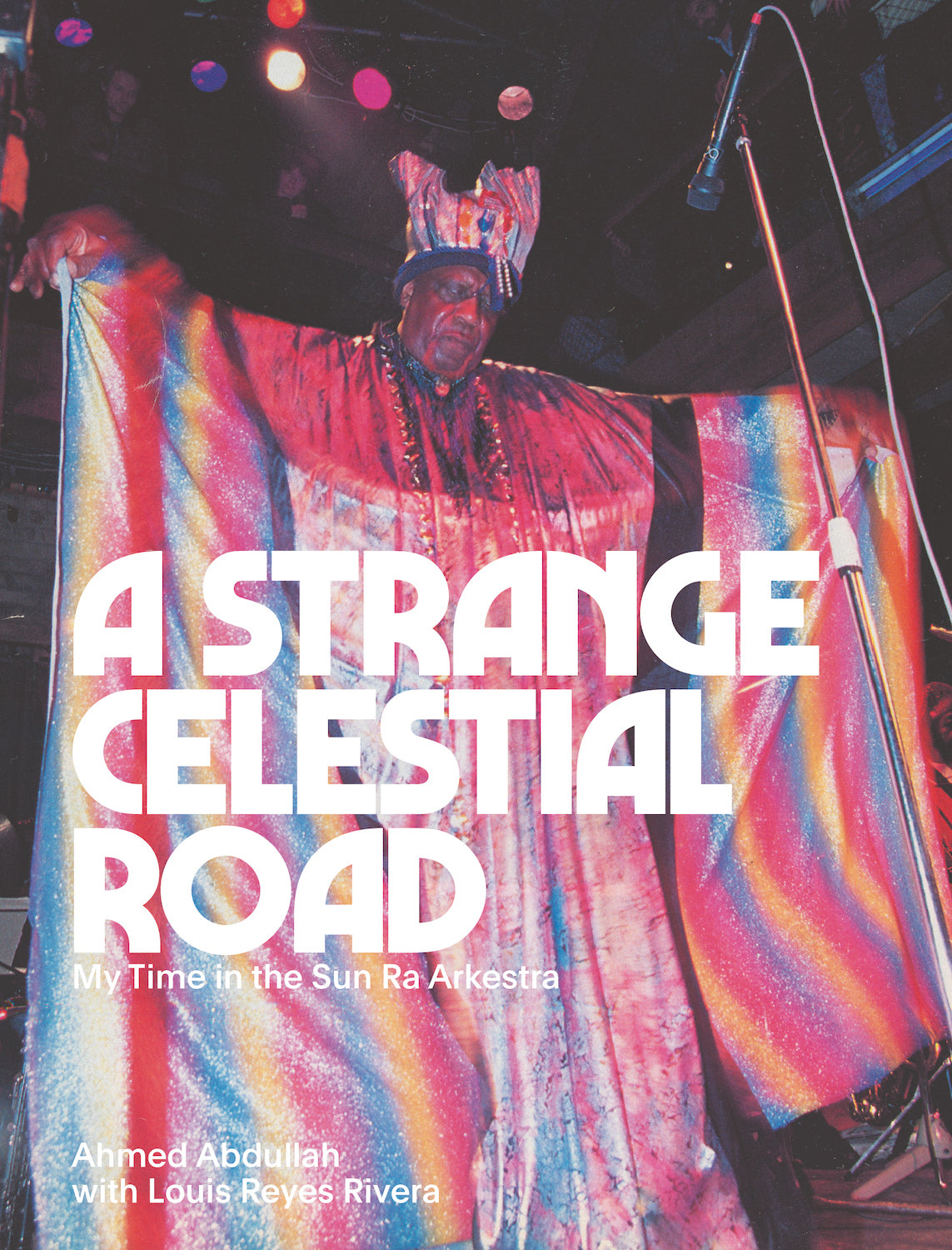Ahmed Abdullah: A Strange Celestial Road

In this captivating memoir, the first full-length account of life in the Arkestra by any of its members, Harlem-born trumpeter Ahmed Abdullah recounts two decades of traveling the spaceways with the inimitable composer, pianist, and big-band leader Sun Ra. Gigging everywhere from the legendary Bed-Stuy venue the East to the National Stadium in Lagos, Abdullah paints a vivid picture of the rise of loft jazz and the influence of Pan-Africanism on creative music, while capturing radical artistic and political developments across Brooklyn and Lower Manhattan in the 1970s and ’80s. Richly illustrated with more than fifty pages of photographs and posters from Adger Cowans, Marilyn Nance, Val Wilmer, and others, A Strange Celestial Road interweaves the author’s own moving story—his battles with addiction, spiritual development, and life as a working class performer—with enthralling tales of tutelage under Cal Massey, collaborations with the likes of Ed Blackwell, Marion Brown, and Andrew Cyrille, and profound, occasionally confounding, mentorship by Sun Ra. Originally written in the 1990s with the help of Nuyorican poet Louis Reyes Rivera and published now for the first time, with a foreword by Salim Washington, A Strange Celestial Road is not only an autobiography, but a history of a remarkable and under-documented movement in music.
AHMED ABDULLAH joined the Sun Ra Arkestra as a trumpeter in 1974 and remained a member for more than twenty years. Born in Harlem in 1947, he became an important figure in the New York loft jazz movement, forming the group Abdullah in 1972, and going on to found the Melodic Art-Tet with Charles Brackeen, Ronnie Boykins, and Roger Blank in the early 1970s and The Group with Marion Brown, Billy Bang, Sirone, Fred Hopkins and Andrew Cyrille in 1986. Abdullah is a co-founder of the Central Brooklyn Jazz Consortium, has been the music director of Dianne McIntyre’s Sounds in Motion Dance Company, and is currently music director at the historic venue Sistas’ Place in Bedford-Stuyvesant, Brooklyn. He has been a music instructor at Carnegie Hall and Brooklyn Philharmonic Orchestra, and teaches at the New School for Social Research in Manhattan and an elementary school in central Brooklyn.
LOUIS REYES RIVERA (1945–2012) was a Puerto Rican poet from Brooklyn. Known as the “Dean of Nuyorican Poetics,” he led creative writing workshops in community centers and prisons across New York, lectured on Latin and Black diasporic history and literature at New York colleges including Hunter, Boricua, Pratt, and Stony Brook; and was a leader in the 1969 student movement at CUNY, leading to the founding of its department of ethnic studies. Rivera was also a prolific editor, working on books such as John Oliver Killens’s Great Black Russian: The Life and Times of Alexander Pushkin, and a translator of works by Puerto Rican poets Clemente Soto Velez and Otto Rene Castillo. His own poetry collections include Who Pays the Cost (1977), This One for You (1983), and Scattered Scripture (1996), which received an award from the Latin American Writers Institute.
SALIM WASHINGTON is a saxophonist, composer, and scholar based in Durban, South Africa, where he is a professor at University of KwaZulu-Natal. He is a co-author, with Farah Jasmine Griffin, of Clawing at the Limits of Cool: Miles Davis, John Coltrane, and the Greatest Jazz Collaboration Ever (2009) and a contributor to Yellow Power, Yellow Soul: The Radical Art of Fred Ho (2013).
"There are other worlds they have not told you of," Sun Ra said. The trumpeter Ahmed Abdullah, a longtime member of Sun Ra's Arkestra, has journeyed through several of those extraterrestrial worlds of sound, and returned to Earth to tell the tale, in this invigorating memoir of a life in Black Creative music.
Adam Shatz, US editor of the London Review of Books
In this first book-length reportage from behind the scenes of Sun Ra’s world, Ahmed Abdullah manages to express the omniverse-exploding wonder of Ra as well as the musical mechanics of the Arkestra and its complex interpersonal politics. His invaluable and unique perspective—focused on the woefully overlooked work of the band from the 1970s forward—is brilliantly articulated in these information-packed, often hilarious pages, which are essentially impossible not to turn.
John Corbett, author of Pick Up the Pieces: Excursions in Seventies Music
A rare personal glimpse into the life of one of the twentieth century's most monumental and imposing figures.
Matthew Blackwell, The Wire
In a social climate, where there are attempts to erase or distort the history of the Black experience, it is important to hear stories from the perspectives of those who have lived through these experiences. This is the contribution of Ahmed Abdullah and Louis Reyes Rivera. One may view A Strange Celestial Road as a reference book on Black jazz artists during the '60s and '70s, an insider’s story on the musician’s life, and a cathartic rendering of the journey of the artist.
Dr. Brenda M. Greene, Our Time Press
A major addition to not only the literature about Sun Ra, but also to the autobiographies of African American composer-performers.
Bill Shoemaker, Point of Departure